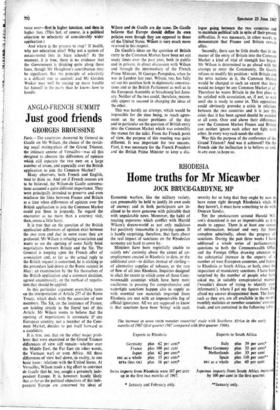Just good friends
ANGLO-FRENCH SUMMIT GEORGES BROUSSINE
Paris.—The courtesies showered by General de Gaulle on Mr Wilson. the choice of the ravish- ing royal resting-place of the Grand Trianon, the intimate annexe of Versailles—was all this designed to obscure the differences of opinion which still separate the two men on a large number of issues, and especially over the British application to join the Common Market?
Many observers, both French and English, tend to think so. And yet &French sources are to be believed, the Wilson-de Gaulle conversa- tions assumed a quite different importance. They were principally intended to preserve and even reinforce the links between France and Britain at a time when differences of opinion over the British application to join the Common Market could put them in jeopardy. To regard the encounter as no more than a courtesy visit, then, seems a little hasty.
It is true that on the question of the British application differences of opinion exist between the two men and that in some cases they are profound. Mr Wilson is refusing association and wants to see the opening of some fairly brisk negotiations between Britain and the Six. The General is keeping open the French offer of association and, as far as the actual reply to the British request is concerned, he is sticking to the procedure laid down at the Rome summit in May : an examination by the Six themselves of the British application and a common decision, agreed unanimously, on the method of negotia- tion that should be applied.
In this particular argument everything turns on the interpretation of Article 237 of the Rome Treaty, which deals with the accession of new members. The Six, on the insistence of France, are holding strictly to the literal text of this Article. Mr Wilson seems to believe that the opening of negotiations is automatic if' any European country, not a member of the Com- mon Market, decides to put itself forward as a candidate.
It is true, too, that on the other major prob- lems that were examined at the Grand Trianon differences of view still remain—whether over the Middle East, the Far East (in other words, the Vietnam war) or even Africa. All these differences of view boil down, in reality, to one basic issue : relations with the United States. At Versailles, Wilson made a big effort to convince de Gaulle that he, too, sought a genuinely inde- pendent Europe. It is, however, hardly likely that as far as the political objectives of this inde- pendent Europe are concerned the ideas of Wilson and de Gaulle are the same. De Gaulle believes that Europe should define its own policies even though they are opposed to those of the United States. Wilson is very much more reserved in this respect.
De Gaulle's ideas on the question of British entry to the Common Market have been set out many times over the past year, both in public and in private, in direct discussion with Wilson and through the intermediary of the French Prime Minister, M Georges Pompidou, when he was in London last year. Wilson, too, has fully set out his position both in diplomatic conversa- tions and to the British Parliament as well as to the European Assembly at Strasbourg last Janu- ary. Neither of the two could, therefore, reason- ably expect to succeed in changing the ideas of the other.
This was hardly an attempt, which would be impossible for the time being, to reach agree- ment on the major problems of the day and in particular on the question of British entry into the Common Market which was ostensibly the reason for the talks. From the French point of view, the purpose of this meeting was quite different. It was important for two reasons. First, it was necessary for the French President and the British Prime Minister to keep a dia-
Josue going between the two countries and to maintain political talk in spite of their present difficulties. It was necessary, in other words, to demonstrate that France and Britain remain allies.
Secondly, there can be little doubt that in the matter of the entry of Britain into the Common Market a kind of trial of strength has begun. Mr Wilson is determined to go ahead with the attempt to enter the Community. De Gaulle refuses to modify his position : with Britain and the EFTA nations in it, the Common Market would be changed to such an extent that there would no longer be any Common Market at all. Therefore he wants Britain in the first place to be satisfied with association, or, if not, to wait until she is ready to come in. This opposition could obviously provoke a crisis in relations between the two countries and it is just this crisis that it has been agreed should be avoided at all costs. Over and above their differences over the Common Market France and Britain can neither ignore each other nor fight each other. In every way each needs the other.
Was this the purpose of the conference of the Grand Trianon? And was it achieved? On the French side the inclination is to believe so and, in any case, to hope so.






























 Previous page
Previous page